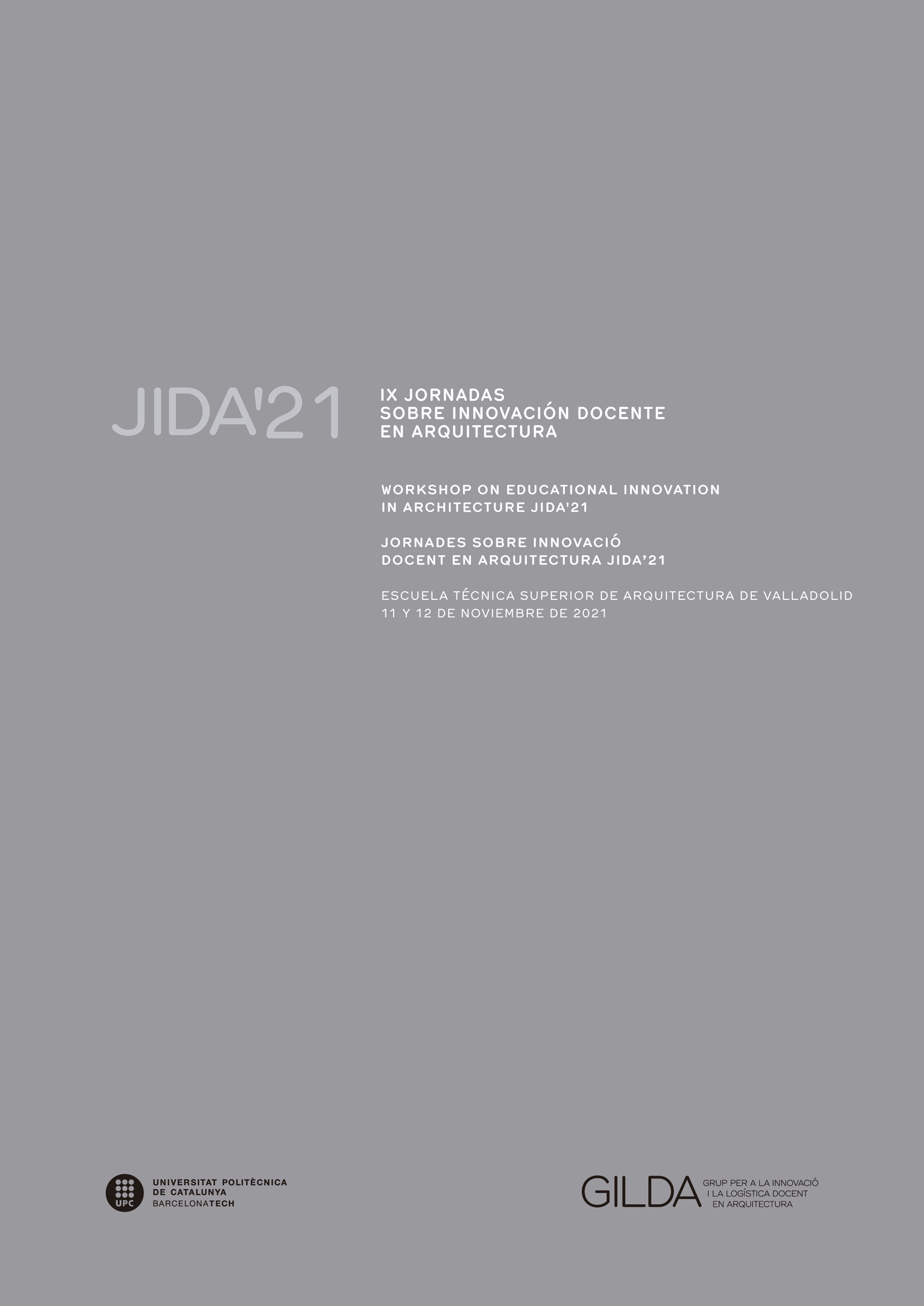Active student participation: gamification and creativity as teaching strategies
DOI:
https://doi.org/10.5821/jida.2021.10595Keywords:
gamification, creativity, active participation, cooperative learning, architectural compositionAbstract
The methodological revolution of the Bologna Plan has placed students at the center of the teaching-learning processes, encouraging their participation based on a symmetrical dialogue with the teaching staff. The methodologies thus become more active and require a greater commitment on the part of the students in their training and in the acquisition of knowledge and skills. Within the area of knowledge of History, Theory and Composition of Architecture, we propose a responsible appropriation of the learning processes. For this, from a creative use of the supports and insisting on their architectural specificity, the strategies are based on gamification and creativity, within a cooperative learning methodology. In this paper we present a training activity in the framework of learning the history of the contemporary city in the last year of architecture at the School of Seville.
References
BLOOM, B.S. (1979). Taxonomía de los objetivos de la educación: clasificación de las metas educativas. Bilbao: Editorial Marfil.
CHOMSKY, N. (2001). La (des)educación. Barcelona: Crítica.
DÍEZ MEDINA, C. (2018). “Pan, amor y fantasia. Ideas para ‘actualizar’ la enseñanza de la Composición Arquitectónica”. García-Escudero, D. y Bardí i Milà, B. (eds.) En: JIDA’18. VI Jornadas sobre innovación docente en arquitectura. Disponible en <http://dx.doi.org/10.5821/jida.2018.5528> [Consulta: 6 de septiembre de 2021]
GARCÍA VÁZQUEZ, C. (2016). Teorías e Historia de la Ciudad Contemporánea. Barcelona: Gustavo Gili.
GARCÍA-CASAUS, F.; CARA-MUÑOZ, J.F.; MARTÍNEZ-SÁNCHEZ, J.A.; y CARA-MUÑOZ, M.M. (2020). “La gamificación en el proceso de enseñanza-aprendizaje: una aproximación teórica”. Logía, educación física y deporte, Vol. 1 (1), pp. 16-24 <https://logiaefd.com/wp-content/uploads/2020/09/PDF-8.pdf> [Consulta: 6 de septiembre de 2021]
KLIMENKO, O. (2017). “Bases neuroanatómicas de la creatividad”. Revista Katharsis, 24, pp. 207-238. Disponible en <https://revistas.iue.edu.co/index.php/katharsis/article/view/971/1392> [Consulta: 6 de septiembre de 2021]
LLEDÓ, E. (2018). Sobre la educación. La necesidad de la Literatura y la vigencia de la Filosofía. Barcelona: Penguin Random House Grupo Editorial.
LÓPEZ DE ASIAÍN, M. y DÍAZ-GARCÍA, V. (2020). “Estrategias educativas innovadoras para la docencia teórica en Arquitectura”. Bardí i Milà, B. y García-Escudero, D. (eds.) En: JIDA’20. VIII Jornadas sobre innovación docente en arquitectura. Disponible en <http://hdl.handle.net/2117/331292> [Consulta: 6 de septiembre de 2021]
LÓPEZ-FERNÁNDEZ, V. y LLAMAS-SALGUERO, F. (2018). “Neuropsicología del proceso creative. Un enfoque educativo”. Revista Complutense de Educación, Vol. 29 (1), pp. 113-127. <http://dx.doi.org/10.5209/RCED.52103> [Consulta: 6 de septiembre de 2021]
LOREN-MÉNDEZ, M. (2019). Propuesta para candidature en concurso de acceso a cuerpo de catedráticas de Universidad. Resolución Universidad de Sevilla de 29 de julio de 2019. BOE de 7 de Agosto de 2019. Plaza 1711/2019. Área de Conocimiento: Composición Arquitectónica. Proyecto docente e investigador. Sevilla: Universidad de Sevilla.
LOREN-MÉNDEZ, M. (2021). “Architectural History, Theory and Composition 4: City” en Djokić, V., Philokyprou, M., Nikezić, A., Sorbo, E., Sakantamis, K. y Loren-Méndez, M. (eds.) Review: Best Practices in Educating Sustainability and Heritage. Belgrado: University of Belgrade.
MACHADO, A. (1957). Juan de Mairena, I. Buenos Aires: Losada.
MOSQUERA GENDE, I. (2019). “Diez ideas para fomentar la creatividad de nuestros alumnos (y de paso, la propia)” en Unir, 23 de mayo. <https://www.unir.net/educacion/revista/diez-ideas-para-fomentar-la-creatividad-de-nuestros-alumnos-y-de-paso-la-propia/> [Consulta: 6 de septiembre de 2021]
MUJER TENÍA QUE SER, “Entrevista a Siri Hustvedt”. La Sexta < https://www.lasexta.com/programas/el-intermedio/mujer-tenia-que-ser-sandra-sabates/siri-hustvedt-para-los-hombres-heterosexuales-someterse-a-la-voz-de-una-autora-es-como-una-castracion_201910305dba09260cf2cf75acb2b372.html> [Consulta: 6 de septiembre de 2021]
RAMÓN-CONSTANTÍ, A. y CATALÁN-TAMARIT, F. (2016). “El impulso de actividades innovadoras como apoyo a la docencia de asignaturas de base teórica. Enfocado a la docencia de asignaturas pertenecientes al Departamento de Composición Arquitectónica”. En: JIDA’16. IV Jornadas sobre innovación docente en arquitectura. Disponible en <http://hdl.handle.net/2117/98344> [Consulta: 6 de septiembre de 2021]
SALAMON, J. (2004). “Keeping creativity alive, even in Hell” en The New York Times. Disponible en <https://www.nytimes.com/2004/09/10/arts/design/keeping-creativity-alive-even-in-hell.html?referringSource=articleShare> [Consulta: 6 de septiembre de 2021]
SCHELLING, F.W.J. (2008). Lecciones sobre el método de los estudios académicos. Buenos Aires: Losada.
SCHELSKY, H. (1963). Einsamkeit und Freiheit. Hamburgo: Rowohlt.
WEISBERG, R.W. (1998). “Creativity and Knowledge: A Challenge to Theories” en Sternberg, R. (ed.) Handbook of Creativity. Cambridge: Cambridge University.
ZAYAS LATORRE, B. y SAHUQUILLO MATEO, P. (2016). “Metodologías para una ética docente aplicada”. Edetania (50), pp. 175-189. Disponible en <https://revistas.ucv.es/index.php/Edetania/article/view/26> [Consulta: 6 de septiembre de 2021]






















